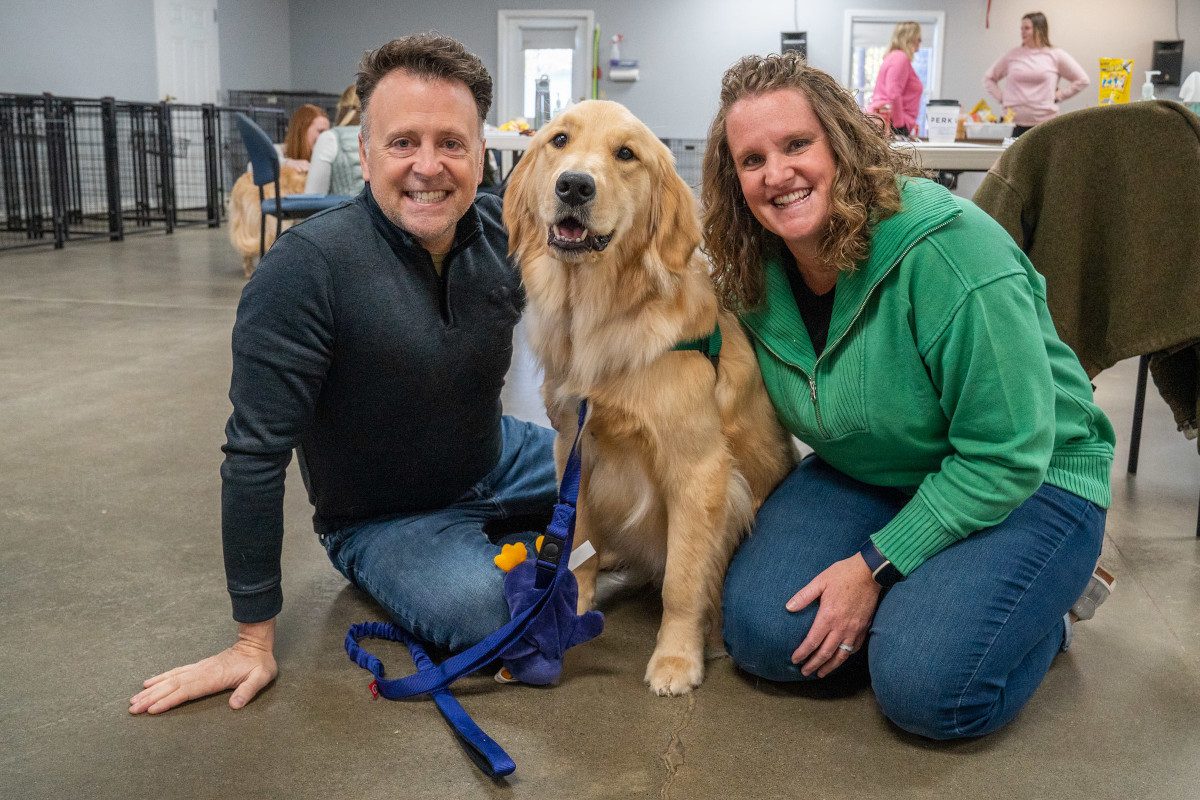A new ‘Captain’ at the helm in some Penn State Health pediatric outpatient clinics

A new ‘Captain’ is steering the ship for some patients at Penn State Health Children’s Hospital.
The facility dog program at the region’s only children’s hospital is again expanding by four legs as Captain, a golden retriever, begins working in two outpatient clinics. Captain joined the pack yesterday to help young patients at the orthopedics and neurophysiology pediatric specialty clinics at 30 Hope Drive on the Milton S. Hershey Medical Center campus.
Captain works with his primary handler, Michelle Flynn, certified child life specialist, and secondary handler, Derek Flynn, physician assistant in the Division of Pediatric Orthopaedics. He will spend his time helping pediatric patients receiving outpatient orthopedic, physical medicine and rehabilitation and neurophysiology services. Captain will be busy with a variety of tasks, such as helping to provide distraction and coping during pin removal procedures, demonstrating casting for bone injuries, helping clinical teams with range of motion assessments, helping patients learn how electroencephalograms work and being with patients to provide canine companionship and a calming presence.
“I am thrilled to work with Captain and expand our facility dog program,” Michelle Flynn said. “So many patients and families will benefit from Captain’s unique role and skillset.”

Captain was raised and trained by Canine Assistants in Georgia, where he learned skills unique to working with kids at a children’s hospital or outpatient center. Michelle Flynn and Derek Flynn – who are not related – traveled to Georgia to meet Captain and learn how to integrate him into their daily interventions and programming while maintaining a safe environment of care.
The Children’s Hospital became the first children’s hospital in Pennsylvania to establish a facility dog program in 2016, when its first employee, a golden retriever named Kaia, started on the job. Kaia spends most of her time supporting patients in radiology and radiation oncology with her primary handler, Ashley Kane, manager of the Child Life Program. Pilot, a black golden retriever, joined the team in 2021 and tends to patients in the Pediatric Surgical Care Unit and Pediatric Intensive Care Unit with his primary handler, Stacy Gloudemans. Kaia, Pilot and Captain are full time employees of the Children’s Hospital who spend 40 hours a week on the job with their primary handlers, with time allowed for downtime, naps and walks.
The facility dog program is separate from the Pet Therapy Program, which continues to have an important presence in both the Children’s Hospital and adult hospital. The two programs have different kinds of training and help patients in different ways. Facility dogs get extensive training to work in a health care environment and learn specific tasks to help children cope with major and minor hospital procedures. Pet therapy dogs offer companionship, as well as a calming and therapeutic influence for patients.
The facility dog program is made possible by the generosity of donors to Penn State Health Children’s Hospital, including PetSmart, Spirit of Children, H&S Industrial’s “Hope in the Air” Gala and individual donor contributions. It is sustained by ongoing funding from the Kelso Facility Dog Endowment, which was established by an anonymous donor in honor of their dog, a Belgian Malinois named Kelso. The fund provides comprehensive support, including the cost of caring for the facility dogs in their eventual retirement.
If you're having trouble accessing this content, or would like it in another format, please email Penn State Health Marketing & Communications.
